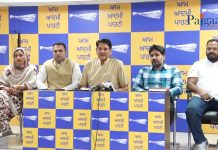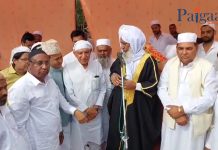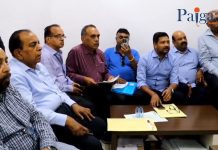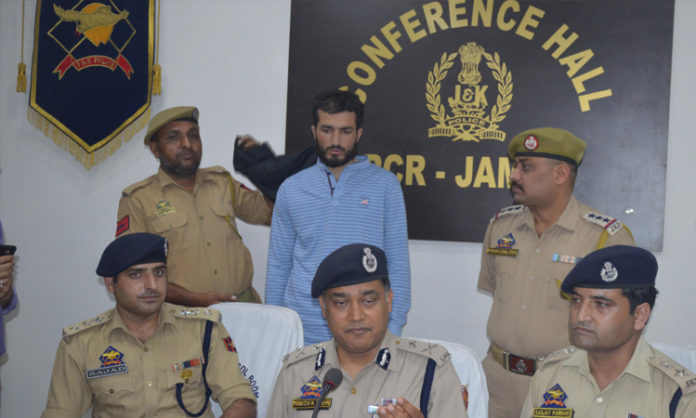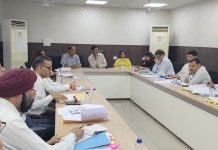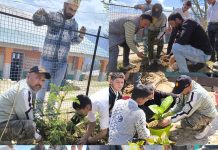JAMMU: The Jammu and Kashmir police has arrested six terrorists, including a PhD scholar, for launching an abortive suicide car bomb attack on a CRPF convoy on Jammu-Srinagar highway last month, thus claiming to have solved the case which could have been a repeat of February 14 Pulwama attack.
The failed attack was jointly hatched by militant outfits Jaish-e-Mohammad and Hizb-ul-Mujahideen under the command of a Pakistani terrorist, Munna Bihari, Jammu Inspector General of Police M K Sinha told reporters here.
The PhD scholar is an active member of Jamiat-e-Talaba, the student wing of banned Jammat-e-Islami (JeI), said Sinha.
His interrogation has revealed that the JeI student wing is engaged in radicalizing the youth for “jehad” in a big way, he added.
Sinha identified five of the arrested terrorists as PhD scholar Hilal Ahmad Mantoo, Waseem alias “Doctor”, Umar Shafi, Aqib Shah, all hailing from Shopian and Shahid Wani alias “Watson” of Pulwama.
The sixth, Hizbul suicide bomber Owais Amin, was arrested on April 1 from Teethar in Banihal when he was trying to escape after unsuccessfully targeting a CRPF convoy with a car bomb near the Jawahar Tunnel the gateway to the Valley on March 31.
Sinha said the National Investigation Agency will take over the case on Tuesday for further investigation, though, he added, the J&K police has completely worked it out.
Sinha said two Hizbul modules were involved in fabricating the car bomb.
“Two modules of Hizbul Mujahideen, one led by Dr Saifullah of Pulwama and the other led by Rayees Khan alias Imad Khan of Shopian had jointly worked to fabricate the car bomb and to take other steps for the explosion,” he added.
Sinha identified a Pakistani terrorist Muna Bihari, operating in south Kashmir in collusion with a local JeM militant, Shahjahan, as the person behind the fabrication of the car bomb.
The Jammu IGP, however, ruled out any link between the February 14 Pulwama car bomb attack which left 40 CRPF personnel dead and the Banihal attack.
He, however, did not rule out the involvement of Pakistan in Banihal attack, saying “the entire module led by Hizbul chief in the valley, Riyaz Naikoo, and Saifullah were involved in the attack along with JeM Pakistani terrorist Muna Bihari”.
He added that the identity of the exact person who directed them to carry out the attack was not yet known.
Sinha said the J&K police was yet to identify the owner of the car used in the failed bid.
“The chassis number and the engine number of the vehicle used in the attack were tempered with. We have sent the vehicle to FSL and they are trying to retrieve the original numbers,” he said.
Sinha said the source of the gelatin sticks too is to be ascertained and the NIA may find it out in subsequent probe.
PhD scholar Mantoo, who was doing research on anxiety among students, was arrested from Central University Bathinda in Punjab, he said.
“Youths are taken in Jamait-ul-Talba after careful screening and once inducted, they are given an extremely hard-core religious orientation and made to indulge in various activities including terror operations,” the IGP said.
Sinha said the radicalisation of the youth is a major threat.
He said the group involved in the fabrication of the IED, procuring gelatin sticks, urea, acids and other material was working under the overall command of the Pakistani terrorist.
“Amin along with his friend Omar and Aqib were working as over ground workers of Rayees Khan who became active terrorist of Hizbul Mujahideen in 2018. After the killing of Hizbul commander Burhan Wani, all four of them were involved in stone pelting,” said Sinha.
These terrorists were selected for the explosion because they had a clean slate and were off the police radar with no criminal case registered against them earlier, the IGP said.
In March, Amin was told by Omar to prepare himself for a major mission. Thereafter, planning and entire conspiracy was hatched in Shopian.
“Owais is a student of BBA and Omar a student BCA in Srinagar and were called to Shopian where Shahid alias Watson facilitated their meeting,” he said, adding that the IED was fabricated in an apple orchard at a place called Turkwangam in Shopian.
“Amin was convinced for a fedayeen attack and agreed. He was motivated by Riyaz Naikoo (Hizbul chief) himself and a meeting was arranged between the two but was asked not to question him and only take his orders.”
He said the car bomb was fabricated between March 15 to 25 and Aqib led this boy to Qazigund and Ramsoo and returned to Banihal.
“Amin unsuccessfully tried to carry out the attack on March 26 on the highway but did not got the opportunity to penetrate the convoy in Qazigund because of the Road Opening Party of the security forces.
“On March 27, he again tried but the IED developed some snag and did not went off. Through a video call to Rayees, he was directed to park the vehicle at Banihal and somebody will come to repair it. Two boys Wasseem and Sahil Abdullah who joined Hizbul Mujahideen and is absconding carried out the repair work,” he said.
Sinha said he managed to penetrate into a CRPF convoy which was moving from Srinagar to Jammu on March 30 but the IED exploded only partially.
“After the minor explosion inside the car, he had turned deaf but jumped out of the car through damaged window panes and took shelter in an abandoned cowshed before he was arrested later while fleeing towards Kashmir,” he said.
He described Pakistani terrorist as “the chief engineering” and said he has trained the local militants in fabricating IEDs. Agencies














